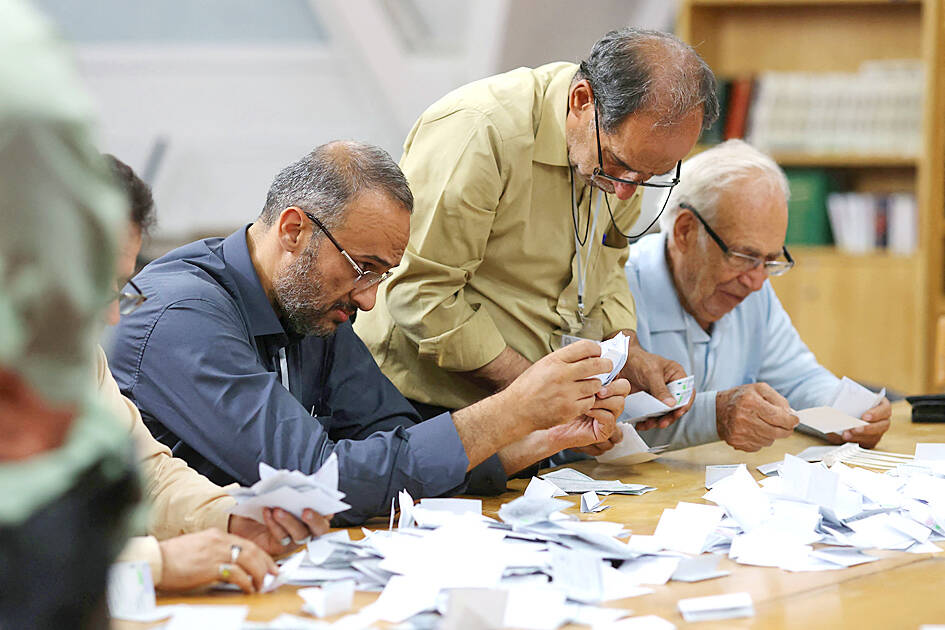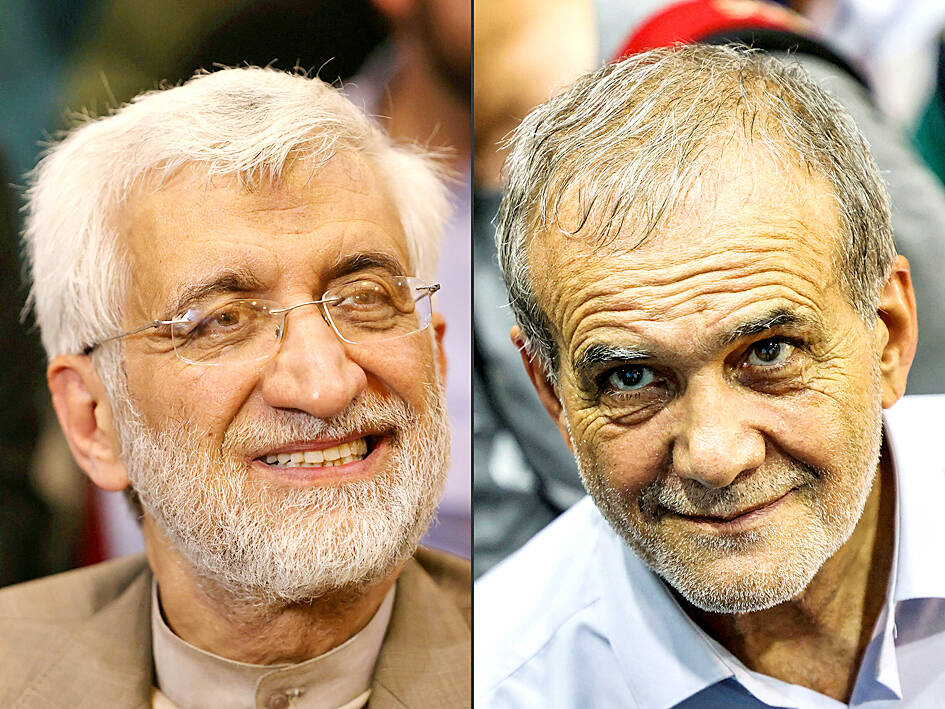The sole reformist in Iran’s presidential election, Masoud Pezeshkian, would face the ultraconservative Saeed Jalili in a runoff, authorities said yesterday, following a vote marred by historically low turnout.
Pezeshkian, 69, secured 42.4 percent of the vote, while Jalili, a 58-year-old former nuclear negotiator, finished second with 38.6 percent, Iranian Election Office spokesman Mohsen Eslami said.
Islamic Consultative Assembly Speaker Mohammad Bagher Ghalibaf was next with 13.8 percent of the vote, while the only other candidate, conservative cleric Mostafa Pourmohammadi, received less than 1 percent.

Photo: Majid Asgaripour / West Asia News Agency via Reuters
“None of the candidates could garner the absolute majority of the votes,” Eslami said, adding that those who finished first and second would face each other in a runoff on Friday next week.
Only slightly more than 40 percent of the 61 million electorate took part in Friday’s first round — a record low turnout for the Islamic republic.
The Election Office said that more than 1 million ballots were spoiled.

Photo: AFP
Out of Iran’s 13 previous presidential elections since the Islamic Revolution in 1979, only one has led to a runoff, which was in 2005.
The poll had been scheduled to take place next year, but was brought forward by the death of Iranian president Ebrahim Raisi in a helicopter crash last month.
The Guardian Council, which vets candidates, had originally approved six contenders, but a day before the election, two of them — Tehran Mayor Alireza Zakani and Iranian Vice President Amir-Hossein Ghazizadeh-Hashemi — dropped out.
Both candidates, after the release of the final results, asked their supporters to vote for Jalili in the runoff.
Ghalibaf followed suit later, asking “all revolutionary forces and supporters” to get behind Jalili’s bid for the presidency.
Friday’s vote took place amid heightened regional tensions over the Gaza war, a dispute with the West over Iran’s nuclear program and domestic discontent over the state of Iran’s sanctions-hit economy.
Iranian Supreme Leader Ayatollah Ali Khamenei had urged people to vote, while opposition groups, especially in the diaspora, called for a boycott, questioning the credibility of elections.
Pezeshkian is a heart surgeon who has represented the northern city of Tabriz in parliament since 2008.
He served as health minister under Iran’s previous reformist president Mohammad Khatami, who held office from 1997 to 2005 and has endorsed Pezeshkian’s bid in the current elections.
Pezeshkian criticized Raisi’s government for a lack of transparency during nationwide protests triggered by the September 2022 death in police custody of Mahsa Amini.
The 22-year-old Iranian Kurd had been arrested for allegedly contravening the country’s strict dress code for women.
In recent campaigning, Pezeshkian called for “constructive relations” with Washington and European countries to “get Iran out of its isolation.”
Jalili, Iran’s former nuclear negotiator, has maintained his uncompromising anti-West stance.
The 58-year-old has held several senior positions in the Islamic republic, including in Khamenei’s office in the early 2000s.
He is currently one of Khamenei’s representatives in the Supreme National Security Council, Iran’s highest security body.

SECURITY: As China is ‘reshaping’ Hong Kong’s population, Taiwan must raise the eligibility threshold for applications from Hong Kongers, Chiu Chui-cheng said When Hong Kong and Macau citizens apply for residency in Taiwan, it would be under a new category that includes a “national security observation period,” Mainland Affairs Council (MAC) Minister Chiu Chui-cheng (邱垂正) said yesterday. President William Lai (賴清德) on March 13 announced 17 strategies to counter China’s aggression toward Taiwan, including incorporating national security considerations into the review process for residency applications from Hong Kong and Macau citizens. The situation in Hong Kong is constantly changing, Chiu said to media yesterday on the sidelines of the Taipei Technology Run hosted by the Taipei Neihu Technology Park Development Association. With

CARROT AND STICK: While unrelenting in its military threats, China attracted nearly 40,000 Taiwanese to over 400 business events last year Nearly 40,000 Taiwanese last year joined industry events in China, such as conferences and trade fairs, supported by the Chinese government, a study showed yesterday, as Beijing ramps up a charm offensive toward Taipei alongside military pressure. China has long taken a carrot-and-stick approach to Taiwan, threatening it with the prospect of military action while reaching out to those it believes are amenable to Beijing’s point of view. Taiwanese security officials are wary of what they see as Beijing’s influence campaigns to sway public opinion after Taipei and Beijing gradually resumed travel links halted by the COVID-19 pandemic, but the scale of

A US Marine Corps regiment equipped with Naval Strike Missiles (NSM) is set to participate in the upcoming Balikatan 25 exercise in the Luzon Strait, marking the system’s first-ever deployment in the Philippines. US and Philippine officials have separately confirmed that the Navy Marine Expeditionary Ship Interdiction System (NMESIS) — the mobile launch platform for the Naval Strike Missile — would take part in the joint exercise. The missiles are being deployed to “a strategic first island chain chokepoint” in the waters between Taiwan proper and the Philippines, US-based Naval News reported. “The Luzon Strait and Bashi Channel represent a critical access

Pope Francis is be laid to rest on Saturday after lying in state for three days in St Peter’s Basilica, where the faithful are expected to flock to pay their respects to history’s first Latin American pontiff. The cardinals met yesterday in the Vatican’s synod hall to chart the next steps before a conclave begins to choose Francis’ successor, as condolences poured in from around the world. According to current norms, the conclave must begin between May 5 and 10. The cardinals set the funeral for Saturday at 10am in St Peter’s Square, to be celebrated by the dean of the College